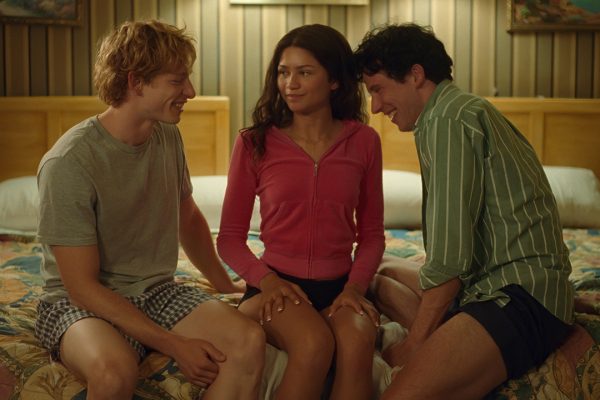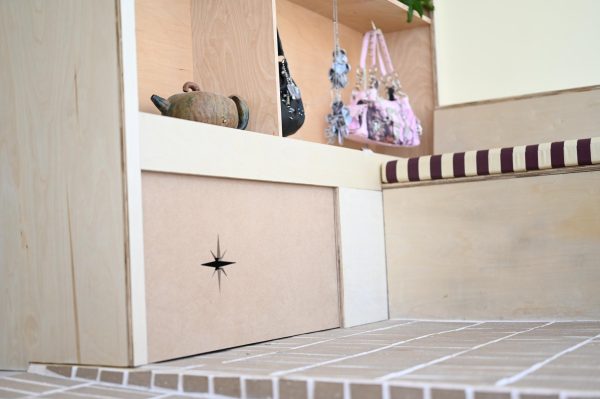‘DREDGE’ combines relaxation and light horror into an engaging, flawed game
May 8, 2023
Video Transcript:
“DREDGE” is a video game which came out last march on every platform to great acclaim. It’s a $25 exploration adventure game developed by Black salt. You play as a fisherman who just came to the fictional archipelago of “the marrows” to try and make a living selling fish to the small towns inhabiting the islands. Or, at least, that’s what the game tells you at the start.
The game really is a half relaxing fishing game, and half Lovecraftian horror story. It manages to mix sailing around scenic islands and finding cool fish along with discovering the mind-bending secrets of an archipelago filled with eldritch horrors into one cohesive, engaging game. It doesn’t always do it perfectly, but nonetheless it’s an engaging, atmospheric, and all-around excellent game.
The core gameplay loop of “DREDGE” is simple – you sail around looking for spots with schools of fish – when you find them and cast your line, you’ll be launched into these little minigames where you have to press a button at the right time to pull up the fish quicker. These are pretty simple and aren’t difficult, but new variations of the game keep cropping up as you discover new types of fish, which keep things fresh. You’ll want to be catching fish as fast as possible, because, as it gets to be night on the open ocean, rarer and more valuable fish come to the surface, but in turn supernatural occurrences will haunt you and damage your boat as it gets into the wee hours of the morning.
Even if you manage to avoid these horrors, your character starts getting sleep deprived and paranoid if he doesn’t have the chance to sleep every night at a dock. The fish you manage to get in these day-long excursions can be sold for money, which you primarily use on upgrading your ship, who’s hull is a tetris like game board, which forces you to think about what fishing rods and engines to equip your boat with in order to leave the most amount of room for the fish you find.
Quickly, though, you realize the real goal of the game is to dredge up relics from a crashed ship and return them to a recluse collector who has mysterious eldritch powers. You’ll complete 5 quests, 1 for each cluster of islands, in order to finish the game. These quests vary in quality and length, but their main purpose is to make you explore their respective islands and find the new fish that inhabit them. What “DREDGE” truly is engaging is the things you discover on the side. There are the 5 main island clusters, but many smaller islands strewn between them – this is where you find all the sidequests, which is where the magic really happens.
For example, there are mysterious cultists in some of the more remote islands who ask you for specific types of fish which become increasingly harder to locate and catch. The first one I found, I gave up on because I couldn’t find one of the fish he wanted. A few days later I found it, but when I returned he had starved to death, unable to give me whatever reward I was expecting. I was disappointed, but this was one of the moments where the game felt alive – your choices, and, more importantly, your mistakes have an actual impact on the gameplay and archipelago. There are plenty of other events like this which underscore the games lovecraftian tone – sell the fishmonger the corrupted fish he craves, and he’ll bar his door for a few days performing some kind of ritual, which makes money tough for a while. You can find the old mayor of the town you fish for stranded on a barren rock. Through his ramblings, you can piece together some of the main secrets of the game. It’s moments like this when the world feels alive which make the game truly special.
The core issue with Dredge, though, is that halfway through the game, you’ve already beat it. Your upgraded engines and suite of eldritch powers trivialize almost all of the threats you run into, which is satisfying at first, but it gets boring fast as you realize there’s no other, more dangerous thing to run into.
You’re a big fish in a little pond – the monster-infested open oceans and cramped channels which used to quicken your heart when you passed through now are mostly inconveniences passing from point A to B. This could be overlooked if so many of the other magical pieces of the game didn’t fall to the wayside along with it – you upgrade your ship quite quickly, making fishing for profit, the mechanical core of the game, a waste of time, and fish often are so big and unwieldy that it isn’t a game of tetris – you simply can fit one or two, and that’s it. Most sadly though, s you venture in the archipelago, instead of meeting the jaded, two-faced, mysterious characters that populate the starting islands with engaging sidequests, you start only ever meeting the robotic feeling “traveling merchant” who conveniently seems to follow you around wherever you go and offers every service you need.
This is especially annoying because the characters are a big strength of the game – in the beginning, everyone you meet is deeply changed by where they live – it’s almost as if they have taken on the uncaring, brutal tack of the ocean surrounding them, dejectedly muddling through life a day at a time. They know there is something deeply wrong about the sea, but most are just too exhausted to care. The only people who smile are hiding something, and every gift comes with a responsibility. It’s almost perfect – very few games execute this tone so well without feeling heavy handed or obnoxiously nihilistic. However, as you venture more into the archipelago, you start only ever meeting this robotic feeling “traveling merchant”. She effortlessly, constantly sails the seas which have broken so many people you’ve met, including your own character, dispensing stiff, one-dimensional dialogue. It’s really a black mark on the otherwise really stellar character design and writing in the game. I’m only being so hard on the game because I love it so much – there are so many great moments of tone and gameplay pacing which far offset the downsides. These issues are most egregious in the middle of the game – If you push through till the end, you’ll start seeing a lot more of the quality worldbuilding present at the beginning – the mechanics of fishing have still fallen to the wayside, but the atmosphere, mystery, and fear comes back. For me, and I think for many others, that’ll make the game more than worth playing to completion.
I’m not going to spoil any significant story points – but rest assured that there are certainly story points worth spoiling. There are twists and turns, stuff definitely doesn’t go the way I expected it to, which is pretty rare in many modern games. If you’re intrigued by anything you have seen or heard about, whether it’s the calm fishing or the eldritch horror I would strongly recommend getting this game and experiencing the fantastic story, atmosphere, and visuals yourself.



















